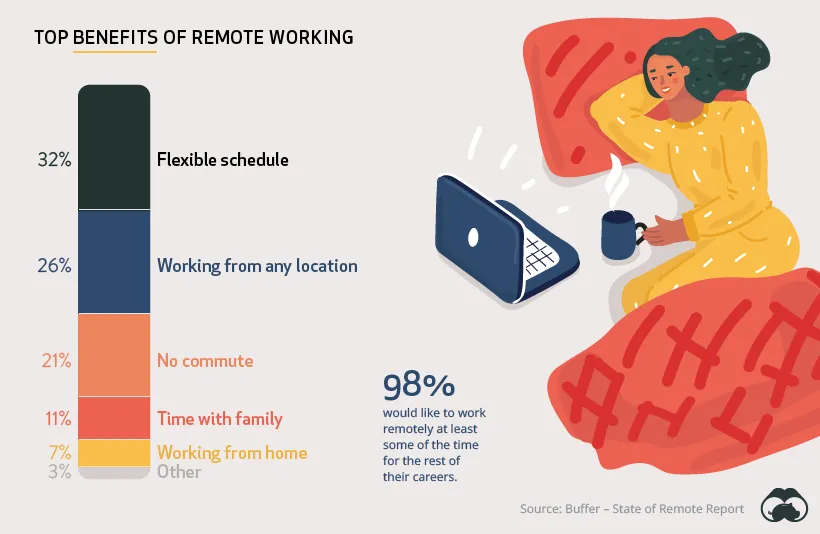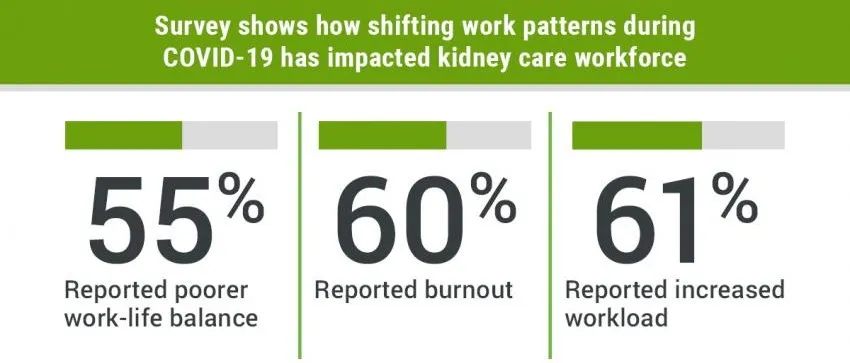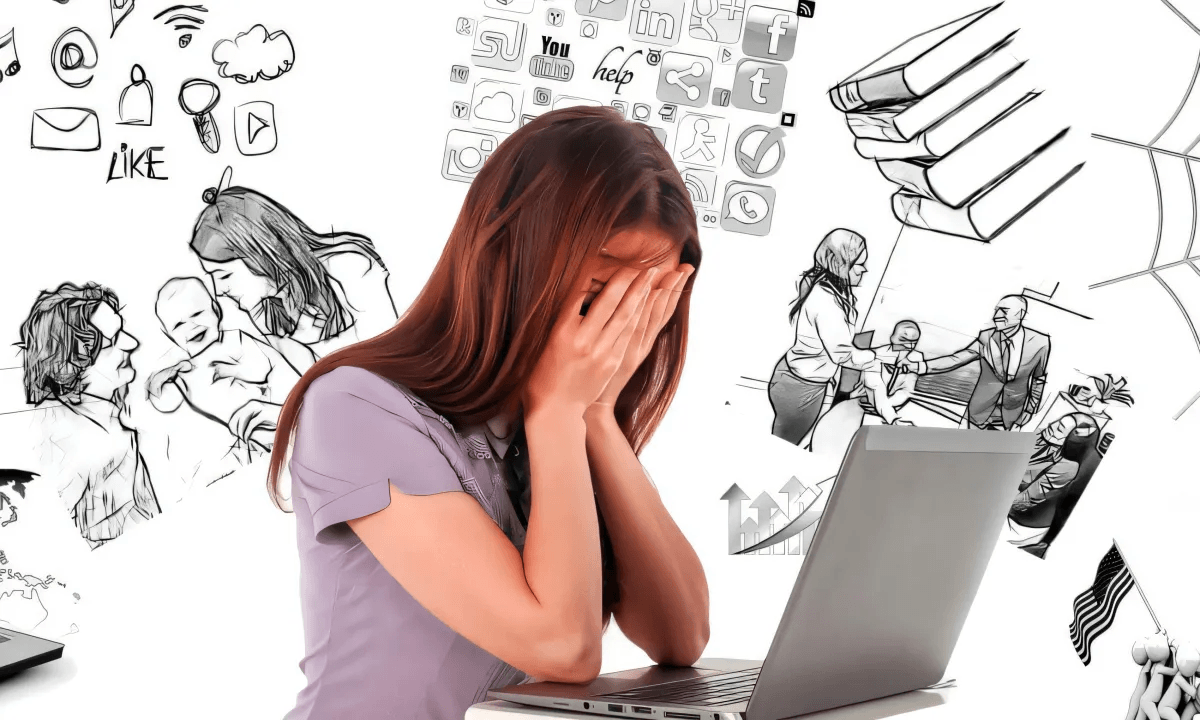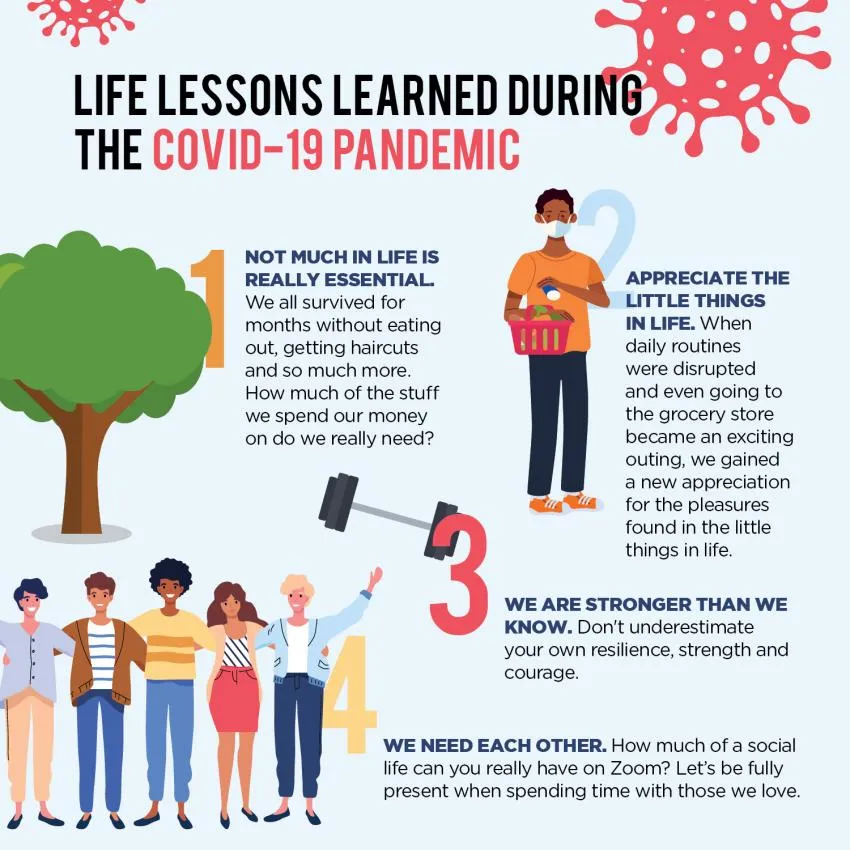How To Deal With Stress And Anxiety Caused By Work From Home
With the spread of the Coronavirus (Covid-19) pandemic, everyone's life underwent a dramatic change across the world, the US included. The work sector made no difference, this pandemic forced people and governments to take precautions they never thought of. Although some of us went back to our normal workplace, many Americans are dealing with a return phase or still working from home.
Due to this pandemic, people feel like going through unexplored waters, forcing people, governments, and businesses to find new methods to continue working and interacting with one another, but without forgetting to take care of themselves, their mental health, and general well-being.
Most people are teleworking full time for the first time in their lives, with no co-worker around, isolated from friends, and family. Due to the disruption of our everyday life, there is an increase in anxiety, stress, panic, and strain affecting us physically, mentally, and financially.
Now more than ever, it is crucial and our future is at stake to look after our mental health and general well-being. Taking precautions to protect ourselves and our loved ones from exposure to the virus, the social distance must not be considered isolation, but a precaution.
Work anxiety during covid-19

While Americans are being vaccinated and they are receiving CDC guidelines, masking and social distancing continue to make life easier for people who are fully vaccinated, however, nowadays Americans are facing a new challenge this pandemic has created: How to deal with the stress and anxiety of going back to work.
Thanks to Coronavirus Covid-19, fear and anxiety have become part of everyday Americans' lives, and part of their work routine whether they still work from home or have just returned to the workplace.
These stressors can quite easily become overwhelming, while you are trying to work through new rules and regulations to maintain safety for you and your customers.
Just as we adapted ourselves to work from home under restrictions during the first weeks of this pandemic, and we are undergoing the same process of going back to the workplace, a process that has caused a considerable amount of stress and anxiety.
Some people are fully vaccinated but still, they are concerned about contracting Covid-19, a fear that is known as breakthrough infection. People who are vaccinated and follow the guidelines of the CDC have done their part.
Although there is no warranty, we DO know that in case of a breakthrough risks of side effects are considerably reduced. It is a situation that true reliable information will reduce anxiety and calm people down.
Understand that anxiety is a normal part of the work. Take all the measures to learn everything you need, what is expected of you during working hours, what rules you need to follow to make physical space safe. Planning ahead of time and practice commutes will help you ease into the normal work routine.
Psychological effects of working from home during covid-19

According to a survey conducted by a group of researchers in England, they relate their findings and conclusions.
- Overall, more people are thinking that working from home is a better option for their general health and wellbeing.
- Nevertheless, those people who turned to work from home had negative health effects. Less connection to colleagues (67%), less physical activity (46%), musculoskeletal problems (39%), and sleep problems (37%).
- 26% of the people who work from home, do it staying on a sofa or a bedroom, this has resulted in half of them having musculoskeletal problems.
- The above-mentioned problems affect women more than men.
- It is negatively impacting mental health, 67%, feel less connected to their colleagues, 56% have difficulties switching off, but only a third of them say have received support for their mental health problems.
Christina Marriot, Chief Executive of RSPH said:
"Our findings reveal that although working from home can be beneficial for people's health and wellbeing, there are stark differences in how different groups have been affected.
For people who have multiple housemates or are working from their bedroom or a sofa, the impact on their mental and physical health is extremely concerning and something we believe that employers need to address.
The changes in the way that millions of people are working have the potential for employers to rethink how they are supporting their employee's mental and physical health.
Some form of home working is likely to continue for millions of people and we urge employers to take the necessary steps to ensure their staff can work from home as safely and healthily as possible."
2020 was a year that required too much flexibility for the professional workers during the COVID-19 crisis, and it revealed that the remote workforce can maintain productivity. However, there is a negative outcome of this, it led to isolation, less collaboration, and a feeling of burnout.
Increased workload during COVID-19

Employers are working extra hours than they used to before the pandemic, considerably more one-on-one meetings and teach check, a study from Clockwise reveals. Another finding from the ASimplyHired survey from September revealed that younger generations are not able to quit thinking of work. Due to the pandemic, there is an increase in stress levels.
According to a Gallup poll, 81% of employees told that the Covid-19 pandemic has caused a varying of disruptions from "fair amount" to "great deal" to the employees. While according to Axios, as per the research conducted by a group of researchers at KFF, they reported that 35% of the workers have resulted in a decline in mental health.
Rene Zung who is vice president of career services at career management for Keystone Partner in Raleigh, N.C., said: "Stress is a common factor in heart attacks, depression, and other health-related problems.
If you are working nonstop that means your body is working to keep you up, adding stress to your organs, especially your brain and heart, because sitting too long at your computer can lead to carpal tunnel, back issues, and vision issues. Wearing earbuds all day long can lead to hearing loss."
Causes of stress that come in the way of our work progress

On a global level, this pandemic has caused people an increase in anxiety, distress, and worry; people are afraid of catching the virus, infecting their family members, furthermore, the precautions about staying isolated and quarantine measures cause stress and anxiety; people fear of being separated from their family members, fear of longterm consequences of this global disruption among many other reasons.
For those reasons it is essential that during this pandemic we should recognize stress for what it is, and take the necessary steps to build our resilience and manage job stress.
Recognize stress symptoms you may experience:
- Feelings of irritation, anger, and denial.
- Feelings of uncertainty, nervousness, and anxiety.
- Lack of motivation.
- Feeling tired and burnout.
- Feeling sad or depressed.
- Problems with sleeping and concentrating.
Some of the relevant factors that lead to stress during the pandemic:
- Concern about being exposed to the virus.
- Overthinking about personal and family needs while working.
- Handling different workloads.
- Lack of access to tools related to work.
- Fear about the future.
- Adapting to different workspaces and routines.
Tips related to building resilience and handle work stress:
- Communicate with work staff relating job stress, its causes, and what to do.
- Recognize what is your responsibility and what to do.
- Stay informed with the facts about Covid-19.
- Take breaks from watching the news and social media, it will add to your stress.
- Connect with others, your loved ones, and relate what you are experiencing.
- Continue with your treatment if you have any mental health conditions, and stay informed of any new worsening symptoms.
- Never misuse prescription drugs, alcohol, and other drugs. If that happens reach for help.

Paula D. Tozer, a contrarian, philosopher, PS warrior, has related the lessons she learned from the pandemic as follows:
- Mother nature is in control. Covid-19 has offered me a whole new window into reality.
- This might happen again but we are going to learn from this and be more prepared for the next time.
- The inner work I have done in the last decade does work when put to the test.
- I can spend months with my husband in our house, alone, and I still like the guy!
- Just how connected we are as a human race.
- Just how deeply we suffer as the human race.
- I can live with a lot less than I did before this crisis. And still not miss much of anything.
- Qi Gong and Yoga are great tension relievers as well as great exercise.
Mark Flanagan, a social worker at Cancer Wellness at Piedmont relates:
"The world has gone through many different challenges, like disease outbreaks, wars, and uncertain times. For better or worse, these times always pass.
That doesn't mean this time isn't significantly challenging, but if we focus on what we can control and do things that are good for our health and the health of those around us, we will come out of this in a more whole state and with a renewed perspective.
It's important to look toward the future and begin building for that future. You can always have hope. Hope never leaves us."
References:
- Campbell, Leah. 8 Tips for Combating Coronavirus Anxiety When You Still Have to Do Your Job Every Day. themuse. n.d. https://www.themuse.com/advice/combat-coronavirus-anxiety-stress-still-do-your-job
- CDC.GOV. Employees: How to Cope with Job Stress and Build Resilience During the COVID-19 Pandemic. CDC.GOV Center for Disease Control and Prevention. Updated Dec. 23, 2020. https://www.cdc.gov/coronavirus/2019-ncov/community/mental-health-non-healthcare.html#:~:text=%2D%20Keep%20a%20regular%20sleep,physically%20active%20or%20relaxing
- CENTER FOR WORKPLACE MENTAL HEALTH. Your Mental Health and Well-being. WORKPLACE MENTAL HEALTH. n.d. https://www.workplacementalhealth.org/employer-resources/working-remotely-during-covid-19
- Eden Health Team. How to Cope With Return to work Anxiety. Edenhealth. May 24, 2021.https://www.edenhealth.com/blog/return-to-work-anxiety/
- Estrada, Sheryl. Employers improve communication as COVID-19 stress increases. HRDRIVE. April 14, 2020. https://www.hrdive.com/news/employers-improve-communication-coronavirus-gallup-poll/575982/
- ICRC Staff. International Committee of the Red Cross, ICRC, COVID-19: Global pandemic may increase stress exponentially. June 01, 2020, https://www.icrc.org/en/document/covid19-global-pandemic-may-increase-stress
- Kidwai, Aman. COVID-19 is causing employees to work longer and spend more time in meetings. HRDRIVE. April 24, 2020. https://www.hrdive.com/news/covid-19-is-causing-employees-to-work-longer-and-spend-more-time-in-meeting/576736/
- Lawrence, Ashley. Reviewed by Donna Shanor. LCSW. LCDC. Coping With Stress While Working During COVID-19. The University of Texas At Austin UT Health Austin. n.d. https://uthealthaustin.org/blog/coping-with-stress-while-working-during-covid-19
- Maurer, Roy. Remote Employees Are Working Longer Than Before. SHRM.BETTER WORKPLACES BETTER WORK. December. 16, 2020. https://www.shrm.org/hr-today/news/hr-news/pages/remote-employees-are-working-longer-than-before.aspx
- NHS Staff. 7 simple tips to tackle working from home. NHS. n.d. https://www.nhs.uk/every-mind-matters/coronavirus/simple-tips-to-tackle-working-from-home/
- Piedmont Healthcare. Managing stress during the ongoing Covid-19 pandemic. Piedmont HEALTHCARE. n.d. https://www.piedmont.org/living-better/managing-stress-during-the-covid-19-pandemic. Final thoughts
- Quora answer. Paula D. Tozer. What lessons in life has the Covid experience made you realize https://www.quora.com/What-lessons-in-life-has-the-covid-experience-made-you-realize
- RSPH Staff. Survey reveals the mental and physical health impacts of home working during Covid-19. RSPH. ROYAL SOCIETY FOR PUBLIC HEALTH. February 04, 2021. https://www.rsph.org.uk/about-us/news/survey-reveals-the-mental-and-physical-health-impacts-of-home-working-during-covid-19.html
Opinions and Perspectives
The suggestion about taking breaks from watching news really helped my anxiety levels.
Interesting point about this potentially happening again. We should learn from this experience.
That statistic about 37% having sleep problems seems low based on my experience.
Makes sense that healthcare resources are mentioned. Mental health support is crucial right now.
Working from home has made me realize how much I took office ergonomics for granted.
True about younger workers struggling more. My first job has been entirely remote and it's challenging.
Setting boundaries with work communications has been crucial for my mental health.
The article makes good points about employer responsibility in supporting remote workers.
I appreciate the emphasis on hope in Mark Flanagan's quote. We need more of that perspective.
The lack of motivation mentioned in the stress symptoms is something I'm currently struggling with.
Those musculoskeletal statistics are alarming but not surprising given improper home office setups.
The suggestion about practicing commutes before returning to work is actually quite smart.
The point about global connection and suffering really hits home. We're all in this together.
Those CDC guidelines helped but the constant changes were stressful to keep up with.
The article could have addressed financial anxiety more thoroughly. That's been a major stressor.
The comparison between pre-pandemic and current workloads is shocking but reflects my experience.
I relate to what Paula Tozer said about learning to live with less. This experience has been eye-opening.
The findings about hearing loss from constant earbuds use is worrying. I hadn't considered that.
Has anyone successfully maintained work-life boundaries while working from home? Would love some advice.
Those resilience tips are great in theory but harder to implement in practice.
The physical activity decrease is concerning. I barely move from my desk all day now.
The fear of infecting family members is something I struggle with daily, even after vaccination.
I find myself having more one-on-one meetings now than ever before. It's exhausting.
The article makes a good point about social distance not meaning isolation. We need to stay connected safely.
Those stress symptoms listed are spot on. I've experienced most of them at some point during this pandemic.
Having multiple housemates while working from home presents its own unique challenges not fully addressed here.
The burnout is real. Never thought I'd miss my commute but it helped separate work and home life.
My sleep schedule is completely off since working from home. Can't seem to maintain regular hours.
Anyone tried those workplace mental health resources mentioned in the article? Were they helpful?
The lack of proper work equipment at home is a major stress factor that employers should address.
I've actually saved money working from home. No commute costs or expensive lunch breaks.
The point about mother nature being in control really resonates. This pandemic has been very humbling.
Anyone else struggling with carpal tunnel from increased computer use? The article mentioned it briefly but it's a real issue.
The statistics about disruption to work life are staggering. 81% reporting fair to great deal of disruption!
What's worked for me is creating a dedicated workspace that I can leave at the end of the day.
Being fully vaccinated helped reduce my anxiety, but I still worry about breakthrough infections.
The isolation factor is real. I live alone and sometimes go days without speaking to anyone face-to-face.
My employer provided ergonomic chairs and proper desks for home use. Makes such a difference!
The comparison between different work spaces is fascinating. Never thought working from a sofa could cause so many health issues.
I appreciate how the article addresses both physical and mental health impacts. They're definitely interconnected.
We really need to normalize taking mental health days, especially during these unprecedented times.
The survey findings about younger generations struggling to disconnect from work is concerning for long-term mental health.
That's interesting! I've had the opposite experience. I miss the structure and focus of the office environment.
Has anyone else noticed their productivity actually increased while working from home? I get so much more done without office distractions.
The point about taking breaks from news and social media is crucial. I had to limit my exposure because it was increasing my anxiety.
Those tips about building resilience are helpful. I've started doing yoga between meetings to manage stress.
Mental health support from employers seems lacking based on these findings. Only a third received help? That's not good enough.
The increased workload statistics are alarming but not surprising. I feel like I'm working way more hours than before.
Working from my bedroom has definitely affected my sleep. My mind associates the space with work now instead of rest.
Yes! We do weekly virtual lunches. It felt awkward at first but now I really look forward to them.
My company implemented virtual coffee breaks which have really helped maintain social connections. Anyone else tried something similar?
The stat about 67% feeling less connected to colleagues is concerning. We need better virtual team building solutions.
I've found setting strict work hours helps with the inability to switch off. When it's 5pm, I shut down my laptop and that's it.
Actually, studies show many women have to handle both work and childcare during remote work, creating extra stress.
Interesting that women are more affected by WFH challenges than men. I wonder if this has to do with balancing additional household responsibilities?
The part about musculoskeletal problems really hits home. My back has been killing me since I started working from my couch!
I can totally relate to feeling disconnected from colleagues while working from home. Video calls just aren't the same as actual face-to-face interactions.
